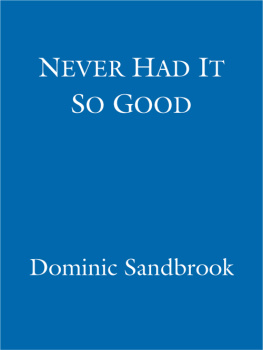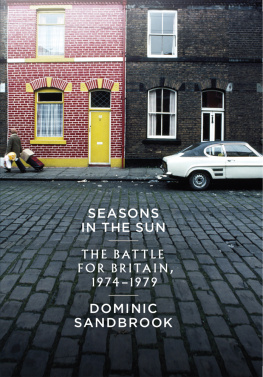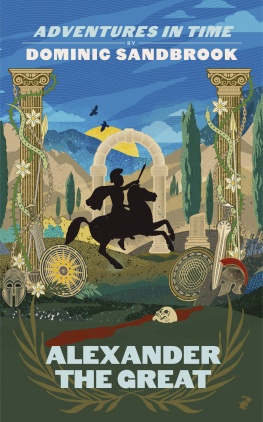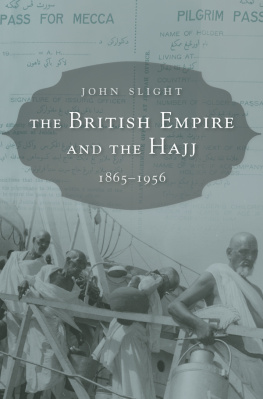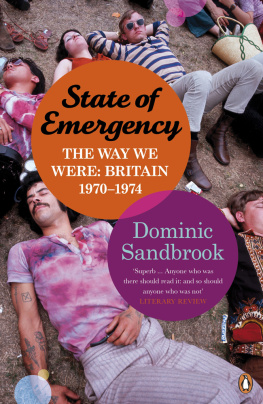Born in Shropshire in 1974, Dominic Sandbrook was educated at Balliol College, Oxford, the University of St Andrews and Jesus College, Cambridge. He taught history at the University of Sheffield and is currently a Senior Fellow at the Rothermere Institute, University of Oxford.
The first volume of Dominic Sandbrooks spectacular history of the Sixties is a chronicle of how the realisation of irreversible national decline hit the British after the Suez crisis It is a tribute to Sandbrooks literary skill that his scholarship is never oppressive. Alternately delightful and enlightening, he has produced a book which must have been an enormous labour to write but is a treat to read
Nick Cohen, Observer
Sandbrook has a winning style not too flashy, but always ready with a killer observation. His judgements are cool and self-assured, his wry wit ever-present but unobtrusive. Above all, he moves effortlessly from the particular to the general and back again, dazzling the reader with peculiar but telling facts, offering tart vignettes of politicians and cultural standard bearers, and demonstrating the extraordinary range of his reading. You should read this remarkable history of a much misunderstood era for both its immense sweep and the piquancy of its detail Without a doubt, this will rank as one of the outstanding historical books of 2005
Christopher Silvester, Sunday Express
There is much to be enjoyed and admired here. Sandbrook writes lucidly and with brio I find myself in awe of Sandbrooks apparent breadth and depth of reading, and his enthusiasm
Sam Leith, Spectator
Brilliant with a novelists skill, [Sandbrook] picks his way through the unfolding drama As a popular, very readable history, this is a massive compendium of quiet, thoughtful information, occasionally punctuated with some very funny anecdotes
Ray Connolly, Daily Mail
A wonderful book a most accomplished, readable and convincing tour through seven years from Suez to Beatlemania. It is refreshing because it probes beneath the surface of events, dissolving many of the myths of the sixties and suggesting, quite rightly, that this was a period of uneven and gradual change rather than a revolution
Lawrence James
A clever and engaging study of Britain as it prepared to swing into the sixties. Never Had It So Good is very good indeed
Amanda Foreman
Refreshing and full of insight. Reading this book is effortless rather like being pulled down a meandering river in a comfortable boat on a sunny day
Gerard DeGroot, Scotland on Sunday
Entertaining and always engaging, with a lovely narrative flow that carries the reader easily through its hundreds of pages
Peter Hitchens, Mail on Sunday
A masterpiece of diligence. And Sandbrook has distilled it into a sharp and fluent prose that swirls elegantly from episode to episode
Robert Winder, New Statesman
Brilliantly written a great book for the general reader, and an ideal revision text for the bright undergraduate studying all of twentieth-century British history
Arthur Marwick, History Today
An astonishing range of material immensely readable a vivid picture of a nation at a time of unsettling and rapid change. There are bound to be many more books on the 1960s, but few will be as well structured, well written or intelligent as this
Simon Heffer, Country Life
Sandbrooks tour of this turn-of-the-decade is rich and fair For the general public, hes done a favour: this is a book which does justice to complexity and to contradictions, and thats worth a lot of scholarly essays
John Lloyd, Glasgow Herald
This is a rich treasure-chest of a book Sandbrook possesses enough verve and self-confidence to have produced an outstanding example of the genre a tour de force
Anthony Howard, Sunday Telgraph
A rivetingly readable debut What I shall cherish this whopping book for, above all, are its unforgettable vignettes Sandbrook has found the hinge on which our history in the 20th century will swing
Godfrey Smith, Sunday Times
Accomplishes for the television age what Barbara Tuchman achieved for the fourteenth century A highly readable history Sandbrooks narrative is reliably fluent, amusing and confident
Richard Davenport-Hines, Times Literary Supplement
Compelling a richly detailed and deeply atmospheric book
Michael Bracewell, Telegraph
A vast and wide-ranging history a thought-provoking survey of the transitional years between the Old Britain and the New
Waterstones Book Quarterly
A most readable and persuasive chronicle I recommend the book to anyone wishing to revive, or perhaps correct, his memories, and to anyone too young to have such memories who is curious to know what all the fuss was about
JWM Thompson, The Oldie
Fantastic A great read, and Grandadll love it, too
Top Read of the Fortnight, Sunday Sport
Splendid rife with revealing detail
Henrik Bering, Policy Review
Published by Abacus
ISBN: 978 0 349 14127 5
Copyright Dominic Sandbrook 2005
The moral right of the author has been asserted.
All rights reserved. No part of this publication may be reproduced, stored in a retrieval system, or transmitted, in any form or by any means, without the prior permission in writing of the publisher.
The publisher is not responsible for websites (or their content) that are not owned by the publisher.
Abacus
Little, Brown Book Group
100 Victoria Embankment
London, EC4Y 0DY
www.littlebrown.co.uk
www.hachette.co.uk
For Ella
CONTENTS
Lets be frank about it; most of our people have never had it so good. Go around the country, go to the industrial towns, go to the farms, and you will see a state of prosperity such as we have never had in my lifetime nor indeed ever in the history of this country. What is worrying some of us is Is it too good to be true? or perhaps I should say Is it too good to last?
Harold Macmillan, 20 July 1957
At the beginning of Kingsley Amis novel Lucky Jim, the hero, a young history lecturer, is accosted by his head of department, Professor Welch. I was wondering about that article of yours, Welch says. If I were you, Dixon, I should take all the steps I possibly could to get this article accepted in the next month or so. Dixon can barely bring himself to meet Welchs eye; he contemplates the frenzied fact-grubbing and fanatical boredom that have gone into his work on medieval shipbuilding, and concludes that the things worth could be expressed in one short hyphenated indecency. In the end, he never does publish it; by the time that he leaves the university in deep disgrace, the article has been stolen by a rival historian, who passes it off in an Italian journal as his own work.
For most of the time when I was working on this book, I was also carrying out my duties as a lecturer in the history department of the University of Sheffield. At one point, in an unexpected echo of Lucky Jim, a senior colleague solemnly advised me to cancel the contract for what he liked to call my coffee-table book, and to devote myself instead to writing a serious scholarly article. Unfortunately, like Jim Dixon, I did not always show my elders the respect they deserved, and I ignored his advice. Unlike Dixon, however, I was fortunate in my colleagues, and I am pleased to thank everyone at Sheffield for their help and advice, especially Pertti Ahonen, Mike Braddick, Flurin Condrau, Simon Hall, Karen Harvey, Zo Laidlaw, Simon Loseby, Patrick Renshaw, Barbara Schmucki, Joe Street and Ted Vallance. I am especially grateful to Robert Cook and Hugh Wilford, who were great sources of encouragement and guidance on everything from Gerry Anderson to Exeter City. And it is a particular pleasure to thank Jenny Atkins, Sarah Buchan, Alastair Eccles, Sin Findlay, Liza Gerrard, Catherine Karalis Isaac, Samantha Kenyon, Kim Lees, Danielle Leighton, Joe Merton, Charles Salt, David Senior, Elliot Shale, Lizzie Soutter, Mike Warbrick and Rachel Weallans for their dedication to Dick Nixon and their splendid camaraderie during the final days.
Next page
